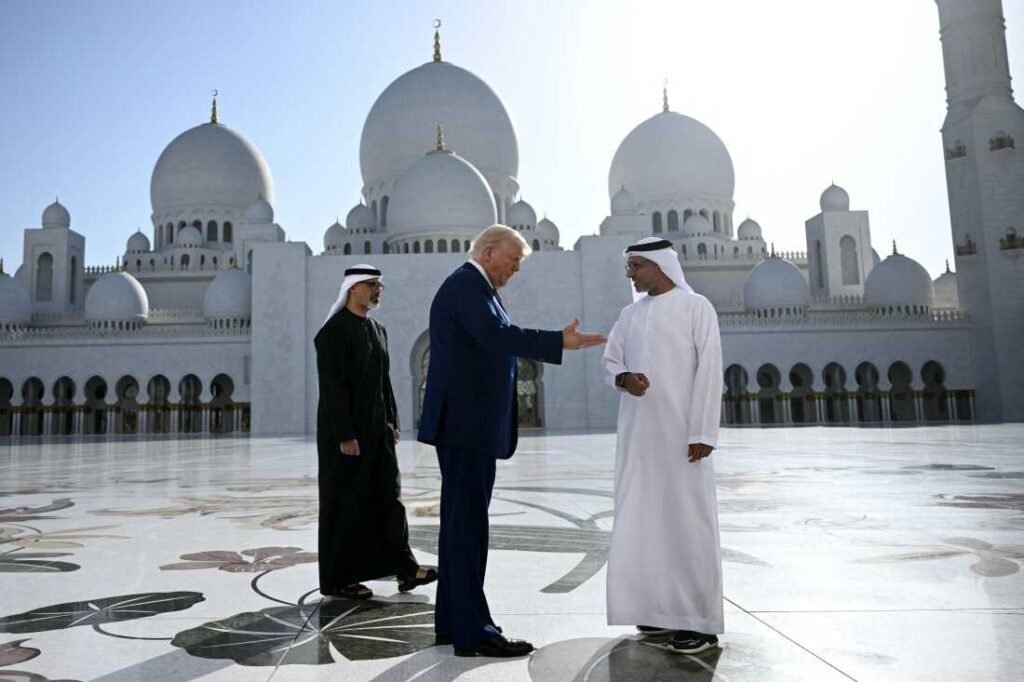The saffron sun above Riyadh; the scent of oud hung heavy in the air. A familiar figure with golden hair came down from the Boeing bird, wearing a red tie flapping in the dry Arabian wind. Donald J. Trump, the man who turned diplomacy into a must-watch reality show, was back in the Arab world. But this time, it was not condos but deals he was sealing with sheikhs, princes, and kings.
Trump knows how to fill a room. Somehow, in a land where alliances are as fleeting as the sands in the desert, he managed to fill that room with all key players. Was it a promise of a golden handshake? A mutual love for skyscrapers? Or perhaps just a collaboration of all the Lords of the lavish lifestyle? Whatever the case may be, one thing is clear: The Arabs are back at the table, and Trump is at the centre of it all, acting as a legitimate dealmaker.
One thing is for sure: Trump did not come for the camel races or the aromatic Arabic coffee (although no doubt he enjoyed both). This was political theatre at its best: a demonstration that while others talk about diplomacy, Trump acts it out. The list read like a who’s who of Middle East power: Saudi Crown Prince Mohammed bin Salman, the UAE’s Sheikh Mohammed bin Zayed Al Nahyan, Qatar’s Emir Tamim bin Hamad, and many others.
Now, the real question: what is the hidden agenda? Some do talk about Trump creating a distance route for a new Middle East alliance, some kind that sidelines Iran and secures energy for the West. Others whisper of secret dealings, implying further normalisation of Saudi-Israel relations. Then, there is the angle of China. In the past weeks, China has cosied up with the Middle East, supplying arms, signing on-the-ground infrastructure deals, and mediating disputes. With Trump being there, it can be a friendly heads-up to say: We are still your best customer, and we don’t share.
President Trump’s tour thrived in strong alliances in Saudi Arabia, Qatar, and the United Arab Emirates. The trip has borne out extraordinary economic promises, such as the phenomenal 1.4 trillion UAE investment in America’s AI sector, the jaw-dropping $440 billion energy partnership with the UAE that will reshape the industry by 2035 or even the Qatari pledge of $42 billion for cutting-edge military hardware in the United States. It even included the skies, as Etihad Airways sealed the deal on 28 gleaming Boeing aircraft, further sealing a tour that concerned more than just dollars and cents. Amidst this all has been the triumphant declaration of “great friendships” between the U.S. and the countries of the oil-rich Gulf.
Trump’s approach has always been transactional, and the Arab kings know it. Want to have good relations with Washington? Perhaps a defence deal? What about a little economic partnership? Trump’s business background revolves around the “I know a guy who knows a guy” network. He doesn’t see world politicians just as politicians; he wants to view them as potential partners. And in the Middle East, where business and politics are often the same thing, that’s a huge advantage. If any man can convince Saudi Arabia, the UAE, and Qatar to come into the room together without side-eyeing each other, it is the guy who wrote The Art of the Deal. Perhaps because he never lectured these leaders on human rights or democracy, as many of his successors have done. His approach is simple: “We’re buddies, we’re strong together, and obviously, business is good.”
Whatever may come next, one irrefutable fact remains. When Trump visits the high-net-worth horizons, the deals seem to get a little bigger, and everybody is directed towards keeping their eyes on it because there is no better salesman in the grand bazaar of global politics. The curtain might have been drawn on this chapter of Trump’s Arabian Nights, but as history would dictate, the sequel is already being planned and is going to be a blockbuster.
